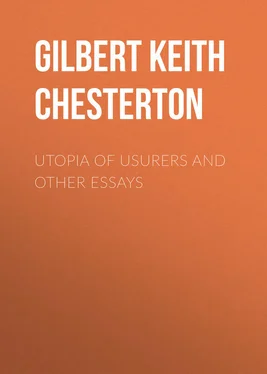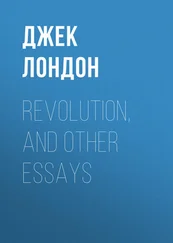Gilbert Chesterton - Utopia of Usurers and Other Essays
Здесь есть возможность читать онлайн «Gilbert Chesterton - Utopia of Usurers and Other Essays» — ознакомительный отрывок электронной книги совершенно бесплатно, а после прочтения отрывка купить полную версию. В некоторых случаях можно слушать аудио, скачать через торрент в формате fb2 и присутствует краткое содержание. Жанр: foreign_antique, foreign_prose, на английском языке. Описание произведения, (предисловие) а так же отзывы посетителей доступны на портале библиотеки ЛибКат.
- Название:Utopia of Usurers and Other Essays
- Автор:
- Жанр:
- Год:неизвестен
- ISBN:нет данных
- Рейтинг книги:4 / 5. Голосов: 1
-
Избранное:Добавить в избранное
- Отзывы:
-
Ваша оценка:
- 80
- 1
- 2
- 3
- 4
- 5
Utopia of Usurers and Other Essays: краткое содержание, описание и аннотация
Предлагаем к чтению аннотацию, описание, краткое содержание или предисловие (зависит от того, что написал сам автор книги «Utopia of Usurers and Other Essays»). Если вы не нашли необходимую информацию о книге — напишите в комментариях, мы постараемся отыскать её.
Utopia of Usurers and Other Essays — читать онлайн ознакомительный отрывок
Ниже представлен текст книги, разбитый по страницам. Система сохранения места последней прочитанной страницы, позволяет с удобством читать онлайн бесплатно книгу «Utopia of Usurers and Other Essays», без необходимости каждый раз заново искать на чём Вы остановились. Поставьте закладку, и сможете в любой момент перейти на страницу, на которой закончили чтение.
Интервал:
Закладка:
G. K. Chesterton
Utopia of Usurers and Other Essays
A SONG OF SWORDS
“A drove of cattle came into a village called Swords;
and was stopped by the rioters.” – Daily Paper.
In the place called Swords on the Irish road
It is told for a new renown
How we held the horns of the cattle, and how
We will hold the horns of the devils now
Ere the lord of hell with the horn on his brow
Is crowned in Dublin town.
Light in the East and light in the West,
And light on the cruel lords,
On the souls that suddenly all men knew,
And the green flag flew and the red flag flew,
And many a wheel of the world stopped, too,
When the cattle were stopped at Swords.
Be they sinners or less than saints
That smite in the street for rage,
We know where the shame shines bright; we know
You that they smite at, you their foe,
Lords of the lawless wage and low,
This is your lawful wage.
You pinched a child to a torture price
That you dared not name in words;
So black a jest was the silver bit
That your own speech shook for the shame of it,
And the coward was plain as a cow they hit
When the cattle have strayed at Swords.
The wheel of the torrent of wives went round
To break men’s brotherhood;
You gave the good Irish blood to grease
The clubs of your country’s enemies;
you saw the brave man beat to the knees:
And you saw that it was good.
The rope of the rich is long and long —
The longest of hangmen’s cords;
But the kings and crowds are holding their breath,
In a giant shadow o’er all beneath
Where God stands holding the scales of Death
Between the cattle and Swords.
Haply the lords that hire and lend
The lowest of all men’s lords,
Who sell their kind like kine at a fair,
Will find no head of their cattle there;
But faces of men where cattle were:
Faces of men – and Swords.
UTOPIA OF USURERS
I. Art and Advertisement
I propose, subject to the patience of the reader, to devote two or three articles to prophecy. Like all healthy-minded prophets, sacred and profane, I can only prophesy when I am in a rage and think things look ugly for everybody. And like all healthy-minded prophets, I prophesy in the hope that my prophecy may not come true. For the prediction made by the true soothsayer is like the warning given by a good doctor. And the doctor has really triumphed when the patient he condemned to death has revived to life. The threat is justified at the very moment when it is falsified. Now I have said again and again (and I shall continue to say again and again on all the most inappropriate occasions) that we must hit Capitalism, and hit it hard, for the plain and definite reason that it is growing stronger. Most of the excuses which serve the capitalists as masks are, of course, the excuses of hypocrites. They lie when they claim philanthropy; they no more feel any particular love of men than Albu felt an affection for Chinamen. They lie when they say they have reached their position through their own organising ability. They generally have to pay men to organise the mine, exactly as they pay men to go down it. They often lie about the present wealth, as they generally lie about their past poverty. But when they say that they are going in for a “constructive social policy,” they do not lie. They really are going in for a constructive social policy. And we must go in for an equally destructive social policy; and destroy, while it is still half-constructed, the accursed thing which they construct.
The Example of the Arts
Now I propose to take, one after another, certain aspects and departments of modern life, and describe what I think they will be like in this paradise of plutocrats, this Utopia of gold and brass in which the great story of England seems so likely to end. I propose to say what I think our new masters, the mere millionaires, will do with certain human interests and institutions, such as art, science, jurisprudence, or religion – unless we strike soon enough to prevent them. And for the sake of argument I will take in this article the example of the arts.
Most people have seen a picture called “Bubbles,” which is used for the advertisement of a celebrated soap, a small cake of which is introduced into the pictorial design. And anybody with an instinct for design (the caricaturist of the Daily Herald, for instance), will guess that it was not originally a part of the design. He will see that the cake of soap destroys the picture as a picture; as much as if the cake of soap had been used to Scrub off the paint. Small as it is, it breaks and confuses the whole balance of objects in the composition. I offer no judgment here upon Millais’s action in the matter; in fact, I do not know what it was. The important point for me at the moment is that the picture was not painted for the soap, but the soap added to the picture. And the spirit of the corrupting change which has separated us from that Victorian epoch can be best seen in this: that the Victorian atmosphere, with all its faults, did not permit such a style of patronage to pass as a matter of course. Michael Angelo may have been proud to have helped an emperor or a pope; though, indeed, I think he was prouder than they were on his own account. I do not believe Sir John Millais was proud of having helped a soap-boiler. I do not say he thought it wrong; but he was not proud of it. And that marks precisely the change from his time to our own. Our merchants have really adopted the style of merchant princes. They have begun openly to dominate the civilisation of the State, as the emperors and popes openly dominated in Italy. In Millais’s time, broadly speaking, art was supposed to mean good art; advertisement was supposed to mean inferior art. The head of a black man, painted to advertise somebody’s blacking, could be a rough symbol, like an inn sign. The black man had only to be black enough. An artist exhibiting the picture of a negro was expected to know that a black man is not so black as he is painted. He was expected to render a thousand tints of grey and brown and violet: for there is no such thing as a black man just as there is no such thing as a white man. A fairly clear line separated advertisement from art.
The First Effect
I should say the first effect of the triumph of the capitalist (if we allow him to triumph) will be that that line of demarcation will entirely disappear. There will be no art that might not just as well be advertisement. I do not necessarily mean that there will be no good art; much of it might be, much of it already is, very good art. You may put it, if you please, in the form that there has been a vast improvement in advertisements. Certainly there would be nothing surprising if the head of a negro advertising Somebody’s Blacking now adays were finished with as careful and subtle colours as one of the old and superstitious painters would have wasted on the negro king who brought gifts to Christ. But the improvement of advertisements is the degradation of artists. It is their degradation for this clear and vital reason: that the artist will work, not only to please the rich, but only to increase their riches; which is a considerable step lower. After all, it was as a human being that a pope took pleasure in a cartoon of Raphael or a prince took pleasure in a statuette of Cellini. The prince paid for the statuette; but he did not expect the statuette to pay him. It is my impression that no cake of soap can be found anywhere in the cartoons which the Pope ordered of Raphael. And no one who knows the small-minded cynicism of our plutocracy, its secrecy, its gambling spirit, its contempt of conscience, can doubt that the artist-advertiser will often be assisting enterprises over which he will have no moral control, and of which he could feel no moral approval. He will be working to spread quack medicines, queer investments; and will work for Marconi instead of Medici. And to this base ingenuity he will have to bend the proudest and purest of the virtues of the intellect, the power to attract his brethren, and the noble duty of praise. For that picture by Millais is a very allegorical picture. It is almost a prophecy of what uses are awaiting the beauty of the child unborn. The praise will be of a kind that may correctly be called soap; and the enterprises of a kind that may truly be described as Bubbles.
Читать дальшеИнтервал:
Закладка:
Похожие книги на «Utopia of Usurers and Other Essays»
Представляем Вашему вниманию похожие книги на «Utopia of Usurers and Other Essays» списком для выбора. Мы отобрали схожую по названию и смыслу литературу в надежде предоставить читателям больше вариантов отыскать новые, интересные, ещё непрочитанные произведения.
Обсуждение, отзывы о книге «Utopia of Usurers and Other Essays» и просто собственные мнения читателей. Оставьте ваши комментарии, напишите, что Вы думаете о произведении, его смысле или главных героях. Укажите что конкретно понравилось, а что нет, и почему Вы так считаете.











